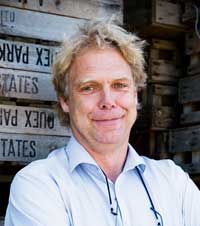FW Awards 2009: Diversification Farmer of the Year finalist – Anthony Curwen

There must be few farmers in the world who can claim their farm is home to a stuffed lion and zebra artfully displayed in a building adorned with antelope skulls.
For Anthony Curwen, his farm’s unique residents are the reason he has diversified the estate he manages into one of the most successful tourist attractions in Kent.
The 1800 acre Quex Park Estate at Birchington is home to Powell-Cotton museum and parkland, which houses one of the largest and most important taxidermy collections of African wildlife in the country.
While separate fron the estate, the museum’s trustees are 47.01% shareholders of the 1000-acre farm, so profits are paid in dividends to pay for the collection’s upkeep.
Anthony grew up on the estate while his father was farm manager, but he didn’t begin working there until 1987 at a point when the farm’s core business was beginning to struggle.
“We initially grew cauliflowers from October to January,” Anthony says. “In 1991 we made £200,000, by the end of the decade we were losing £200,000. Despite better efficiencies, yields and quality, the returns we were getting were awful – we couldn’t get a good premium.”
Realising the business was in trouble, Anthony pulled out of cauliflowers and began growing potatoes.
He cut the farm staff back to three, employed a new farm manager and became the estate manager, giving himself the time and space to look at what could be done on the farm.
Given the estate’s character, the farm was not suited to industrial or storage use. But with 135,000 people living within a four-mile radius, Anthony realised tourism projects were ideal.
In 2005 he sub-let an old farm building and opened Jungle Jims, a children’s play area.
“This region is socially deprived so we have to get the market right but, I thought, if we could get more people onto the estate it would help bring more people to the museum,” he says.
“Four years later we sublet the cow sheds to create a craft village, where everything that’s sold is made on-site. We also opened a garden centre, a 10-acre livery field and we rent out farm buildings as offices and workshops.
“I couldn’t afford to have any risk so I went on the tenancy route for most of the businesses.”
The projects have proved so successful that Anthony has been able to spend more time and money developing the core farm business as well as developing stronger links with other diversification enterprises.
A farm shop and restaurant was opened 18 months ago, with Anthony supplying both enterprises with food produced on the farm.
“We began to get more profitable on the farm so started contracting other farms and producing more. We haven’t needed more men, just bought bigger machinery second-hand,” he says.
“The farm is now very profitable and contract farming further reduces any risk for us.
“Often one of the problems of diversification is keeping an eye on the core business but I think we have done that.”
As well as going to the shop and restaurant, potatoes grown on the farm are sold to St Nicholas and to Tesco, where they are sold as part of the retailer’s local range.
Anthony is also buying his own press to produce rapeseed oil from the rape grown in the farm.
“By promoting our produce’s regional credentials I’m trying to make the estate a destination,” he says.
“The diversification is an on-going thing. In the 1970s Kent saw its heyday as a holiday destination, but people don’t come here any more and we suffer.
“But we are an hour away from a lot of people. About 200,000 visitors come to the estate every year and if we can market this as a destination it would be brilliant.
“We are now making a strong profit now and I hope that the estate will double its profits again in the coming years.
Farm facts
- In entry level stewardship
- Four full-time staff employed on the core farm
- 1000 acres of potatoes and combinable crops
What the judges liked
- “Anthony has a very clear vision for the farm’s future, which relies on a well thought-out marketing strategy and business plan. He hasn’t been daunted by the scale of the project and has kept farming at the core of the business as the enterprise expands.”
